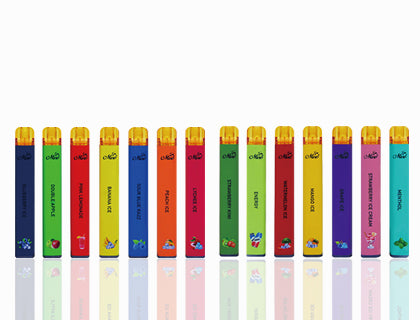RSPCA warning: the danger of discarding electronic cigarettes is increasing, threatening wildlife
RSPCA warning: the danger of discarding electronic cigarettes is increasing, threatening wildlife

Abstract: The waste involved is different, but the number of waste electronic cigarettes that affect animals is increasing.
On March 5, according to foreign reports, new data showed that hundreds of animals had been injured or trapped by garbage in Leicestershire, England. At the time of the shocking discovery, RSPCA warned that the danger of discarding electronic cigarettes was increasing, which posed a real threat to wild animals.
According to RSPCA data, during the three years from 2020 to 2022, 164 animals were trapped or injured by garbage in Leicester County. This is the third highest number in East Midlands, with Nottingham County ranking first with 236 incidents and Lincolnshire ranking second with 227 incidents during the same period. Derbyshire and Northampton received 137 and 108 calls respectively.

In the UK, RSPCA received 10483 calls, averaging nearly 10 calls a day. The waste involved is different, but the number of waste electronic cigarettes that affect animals is increasing.
Electronic cigarettes contain a variety of materials and toxic substances, including plastics, lithium and nicotine. All of these may cause harm to animals. RSPCA warns people that they need to be safely discarded.
After the RSPCA team found that squirrels were playing with discarded electronic cigarettes, the warning became stronger. Evie Button, RSPCA science officer, called on people to consider animal welfare.
She said that garbage is one of the greatest hazards facing wildlife today, and these new hazards such as discarded electronic cigarettes will only increase the risk of animals. Our staff deal with thousands of animals affected by garbage every year - what they see may be just the tip of the iceberg.

"Sadly, for every animal that we can help, there may be many animals that are invisible, unreported, and may even lose their lives. Animals whose heads or necks are stuck in the garbage may suffer serious injuries when trying to break free, or even suffocate to death, while other animals will slowly become weaker and weaker when trying to hunt or find food or water."

Last year, the charity was convened 3042 times to help animals affected by garbage around the UK. Some of the most seriously affected include a fox in London, whose head was stuck by an abandoned plastic bottle and luckily survived, while a duck of Longkorn was entangled by an old dog's toy.

Ms. Barton said that the smallest amount of garbage could kill an animal. She said that these hazards will soon become a life-and-death problem for these animals, and it is urgent to take action to solve this problem positively. It is up to each of us to do our part in the war against garbage.

Abstract: The waste involved is different, but the number of waste electronic cigarettes that affect animals is increasing.
On March 5, according to foreign reports, new data showed that hundreds of animals had been injured or trapped by garbage in Leicestershire, England. At the time of the shocking discovery, RSPCA warned that the danger of discarding electronic cigarettes was increasing, which posed a real threat to wild animals.
According to RSPCA data, during the three years from 2020 to 2022, 164 animals were trapped or injured by garbage in Leicester County. This is the third highest number in East Midlands, with Nottingham County ranking first with 236 incidents and Lincolnshire ranking second with 227 incidents during the same period. Derbyshire and Northampton received 137 and 108 calls respectively.

In the UK, RSPCA received 10483 calls, averaging nearly 10 calls a day. The waste involved is different, but the number of waste electronic cigarettes that affect animals is increasing.
Electronic cigarettes contain a variety of materials and toxic substances, including plastics, lithium and nicotine. All of these may cause harm to animals. RSPCA warns people that they need to be safely discarded.
After the RSPCA team found that squirrels were playing with discarded electronic cigarettes, the warning became stronger. Evie Button, RSPCA science officer, called on people to consider animal welfare.
She said that garbage is one of the greatest hazards facing wildlife today, and these new hazards such as discarded electronic cigarettes will only increase the risk of animals. Our staff deal with thousands of animals affected by garbage every year - what they see may be just the tip of the iceberg.

"Sadly, for every animal that we can help, there may be many animals that are invisible, unreported, and may even lose their lives. Animals whose heads or necks are stuck in the garbage may suffer serious injuries when trying to break free, or even suffocate to death, while other animals will slowly become weaker and weaker when trying to hunt or find food or water."

Last year, the charity was convened 3042 times to help animals affected by garbage around the UK. Some of the most seriously affected include a fox in London, whose head was stuck by an abandoned plastic bottle and luckily survived, while a duck of Longkorn was entangled by an old dog's toy.

Ms. Barton said that the smallest amount of garbage could kill an animal. She said that these hazards will soon become a life-and-death problem for these animals, and it is urgent to take action to solve this problem positively. It is up to each of us to do our part in the war against garbage.
Sample Block Quote
Praesent vestibulum congue tellus at fringilla. Curabitur vitae semper sem, eu convallis est. Cras felis nunc commodo loremous convallis vitae interdum non nisl. Maecenas ac est sit amet augue pharetra convallis nec danos.
Sample Paragraph Text
Praesent vestibulum congue tellus at fringilla. Curabitur vitae semper sem, eu convallis est. Cras felis nunc commodo eu convallis vitae interdum non nisl. Maecenas ac est sit amet augue pharetra convallis nec danos dui.
Cras suscipit quam et turpis eleifend vitae malesuada magna congue. Damus id ullamcorper neque. Sed vitae mi a mi pretium aliquet ac sed elitos. Pellentesque nulla eros accumsan quis justo at tincidunt lobortis denimes loremous. Suspendisse vestibulum lectus in lectus volutpat, ut dapibus purus pulvinar. Vestibulum sit amet auctor ipsum.



















